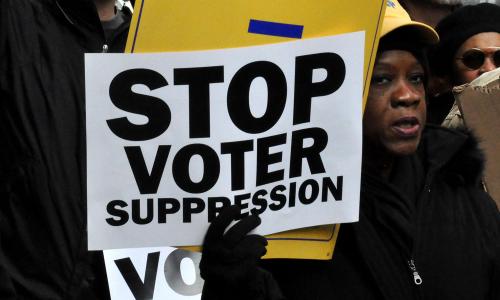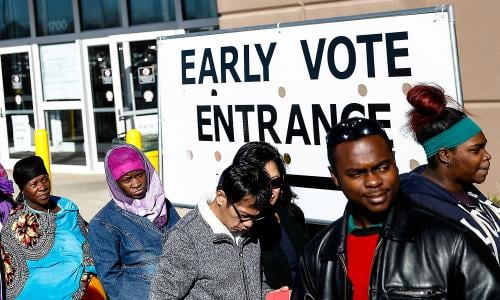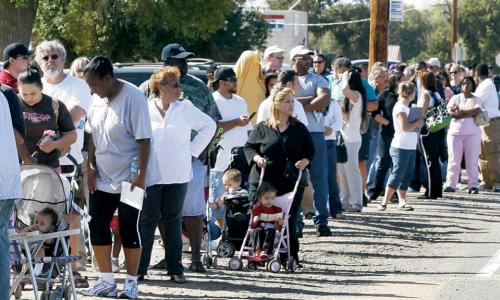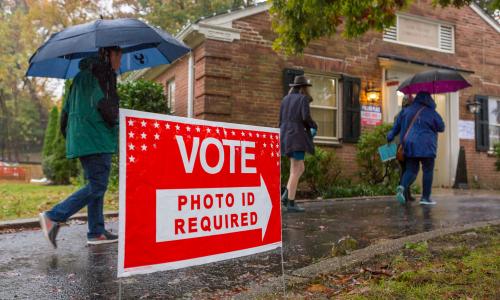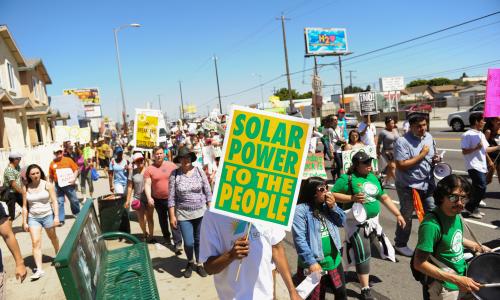Voting is at the heart of people power in a functioning democracy. It’s how we choose between competing policy agendas and priorities, how we govern the institutions that govern us. And, crucially, it’s how we hold our leaders accountable when they fail to serve the public interest. When people are denied their right to vote, it becomes harder for them to advocate for policies that benefit their communities.
Distorting democracy
Attacks on voting rights are not a new problem in the US, but they have grown worse over the past decade. Since 2010, many state governments have shielded themselves from accountability through tactics that weaken democratic institutions by selectively suppressing or diluting votes, with communities of color and low-income communities the most frequent targets. Such tactics include:
Barriers to eligibility such as felon disenfranchisement, restricting times and processes for registering to vote, or aggressive voter purges that remove qualified voters from lists, often requiring them to cast provisional ballots on election day.
Barriers to voting such as removing or limiting early voting, reducing the number of polling places available in targeted communities, or enacting strict voter ID laws with provisions or timetables calculated to make voting more difficult for targeted communities, including people of color and students.
Biased representation—manipulating the design of legislative districts to entrench partisan or racial advantage. This tactic, commonly known as gerrymandering, dilutes the value of opposition votes and reduces competition, so that policymakers effectively get to choose their voters rather than the other way around.
Electoral corruption and health disparities
These undemocratic tactics are not only unjust in themselves—they have policy consequences that hurt people. Our analysis has shown that states with more restrictive voting polices also tend to have worse health outcomes. In addition, legislatures in states with more extreme gerrymandering have been less likely to increase access to health care by expanding Medicaid or providing comprehensive health care services.
Communities targeted by such policies are disproportionately likely to face severe environmental burdens such as air and water pollution. Voter suppression and gerrymandering effectively give polluting industries a green light to continue harming residents of these communities.
Furthermore, there is a vicious-cycle relationship between illness and voter suppression—health problems in a community tend to depress voter turnout, further limiting the community’s ability to use the democratic process to protect itself.
Revitalizing democracy to protect community health
Targeted communities are fighting back—fighting for their rights and for their lives. We all need to support this fight if we care about the future of our democracy.
The importance of the census
The US Census, which is taken once every ten years, provides demographic information that the federal government uses for many purposes. Perhaps its most important role in our democracy is its use in determining the allocation of seats in the House of Representatives (and, as a consequence, in the Electoral College as well).
The accuracy of the Census is directly related to the health of our democracy, because when people are not counted, their communities lose political leverage. (It’s important to understand that while only adult US citizens have the right to vote, the Census is required by law to count all persons, citizen or not.)
Recently, the Trump administration tried to add a question on citizenship to the Census, in a transparent attempt to capitalize on the likelihood that immigrants to the US might decline to participate for fear of deportation or other repercussions. The attempt failed, but it points to the ongoing vulnerability of the Census to political manipulation and the need to remain vigilant against such threats.
National electoral reform
In addition to supporting grassroots efforts to ensure a full census count and implement free and fair elections, we can tell our Congressional representatives to support democracy reform measures such as those listed below—many of which were included in HR1, the For the People Act, which passed the House in 2019 but failed to pass the Senate.
Eliminate barriers to registration through automatic voter registration (such as “motor-voter” laws), same-day registration, and pre-registration for high school students.
Protect voter lists from manipulation by requiring positive evidence of ineligibility before voters can be removed from registration lists.
Expand mail voting and early in-person voting to remove inequalities that result when people with limited resources of time, money, or work flexibility are faced with narrow and inflexible voting periods.
Rein in gerrymandering and partisan bias by requiring non-partisan, independent redistricting commissions, and allow states and cities to adopt multi-seat, proportional representation methods
Limit the power of money in politics by requiring more disclosure of corporate political spending, strengthening the Federal Election Commission (FEC), and moving toward public campaign financing.
Clean up corruption with stronger conflict-of-interest laws and tougher requirements for disclosure of contributions from regulated entities.
